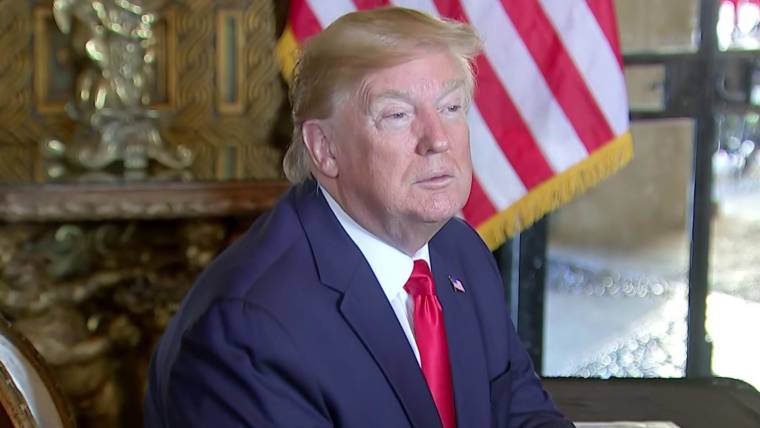The developing challenges to the President raise the possibility that the controversial foreign policy choices that he made in the first three years of his administration could return to haunt him as he asks voters for a second term. At the very least, rising tensions will require a steady diplomatic hand and nuanced presidential leadership as he operates on a fine line of showing strength but stopping short of undue provocation.
The President's first concern is Iran. He is now warning the Islamic Republic that any new threats to Americans or attacks on US targets could trigger an even more serious escalation than the already robust US air raids.
"Iran will be held fully responsible for lives lost, or damage incurred, at any of our facilities. They will pay a very BIG PRICE! This is not a Warning, it is a Threat. Happy New Year!" Trump
wrote in a tweet on Tuesday. And, speaking with reporters later Tuesday as he entered a New Year's Eve gala at Mar-a-Lago, the President said he doesn't want war but that if it comes to conflict, Iran wouldn't last long.
"I don't think that would be a good idea for Iran," Trump said.
The administration rushed extra forces to protect the embassy, as a senior administration official told CNN the White House was "very concerned" about what might happen on Wednesday.
Yet Trump is already taking a risky victory lap on Twitter, comparing his leadership to the Obama administration after the storming of a US consulate in northeastern Libya in 2012, and presenting the results of heightened tensions with Iran as a desirable outcome.
"The Anti-Benghazi!" the President tweeted Tuesday evening. There are limited comparisons between the situations in Baghdad -- where the US embassy is one of the most heavily defended buildings in the world -- and the rudimentary compound used by the roving US ambassador to Libya Christopher Stevens, who was killed in the attack, in the middle of a civil war in Libya.
In many ways, the attack on the US embassy in Baghdad -- which followed US strikes on the militia to avenge the death of a US contractor in the country -- is an almost inevitable consequence of the Trump administration's maximum pressure policy targeting Iran.
Critics have long warned that showy decisions related to Iran and North Korea apparently made to further Trump's own political prospects and not a more sober evaluation of US foreign policy goals could eventually backfire.
Trump's decision to ditch Barack Obama's Iran nuclear deal --
with which Tehran was complying -- and to crank up sanctions has caused a debilitating economic crisis and humanitarian pain in Iran.
Washington says the nuclear deal was one of the worst agreements in history because it did not rein in Iran's missile program or curtail what the US regards as malicious activity and support for terrorism in its neighborhood. The assumption behind Trump's strategy is that Tehran's clerical regime will collapse or that the Iranians will return to the negotiating table to accep
t a far more punitive nuclear deal.Despite some of the most intense anti-government demonstrations in decades, many analysts believe that there is no sign the regime is falling. In fact, there is more evidence that Trump's hardline approach is causing Iran to become more belligerent in its own region -- quite the opposite of the US goal.
"While the Trump Administration has touted its maximum pressure campaign against Iran, the results so far have been more threats against international commerce, emboldened and more violent proxy attacks across the Middle East, and now, the death of an American citizen in Iraq," New Jersey Democratic Sen. Bob Menendez, the ranking member of the Senate Foreign Relations Committee, said.
In response to the US policy, shaped by administration hardliners like Secretary of State Mike Pompeo, Iran has also resumed nuclear activity, even starting up centrifuges in an underground facility dismantled under the Obama-era deal.
Trump's personal prestige on the line in Iraq
The White House says that it doesn't want war and hopes that the fallout from the air strikes will soon cool and the crisis will pass. But if it does not, it may face the most dangerous US-Iran crisis in many years.
That's because the prestige of Trump and the Iranians is now deeply invested in this showdown and uncertainty about erratic decision making on both sides could lead to miscalculations.
And given the hardline position of the Trump administration towards Iran, it does not seem like there is any face-saving option that could quickly limit an escalation once it starts.
The situation tugs Trump between two dueling instincts in his political soul. He loves to look tough -- and live up to his own perceptions of a ruthless commander in chief.
But the President is also loath to be drawn into foreign entanglements -- one of his few inviolable principles and one that takes on more importance as he runs for reelection.
In June, Trump
blinked at the prospect of military action against Iran at the last minute after Tehran's forces shot down a US drone and attacked oil tankers.
Iran may be betting that Trump will do the same again, but such a move might lead to a miscalculation if the President goes against type and could cause reprisals between the enemies that could spin out of control.
The protests at the US embassy in Baghdad raise a troubling historical parallel other than Benghazi. The storming of the US embassy by revolutionaries in Tehran and a
subsequent hostage siege helped doom then-President Jimmy Carter to a single term in the 1980 election.
The political lesson from that historic humiliation is not hard to read, and it may play into Trump's thinking on Iran in the run-up to November's presidential election.
Still, Trump is hugely unpredictable. As the days pass after the recent upsurge in tensions the President may not draw conventional political lessons.
The embassy protests are a reminder from Iran of the huge vulnerability of US troops and diplomats in a nation where they have little leverage and where Tehran appears to be winning the battle for influence over the US -- nearly 17 years after its invasion to overthrow Saddam Hussein.
In such circumstances, given his hostility to the idea of large-scale troop garrisons in the Middle East, it's not impossible Trump could suddenly decide to yank all Americans home.
Such an option would open the President to accusations that he surrendered to Iran -- though he'd be liable to spin it as a victory because it would be yet another campaign promise kept.
Iran leaned into the confrontation on Tuesday seeking to use it to solidify its advantage over Washington in Iraq.
"How and on what basis do you expect the Iraqi people to remain silent on all these crimes?" Foreign Ministry spokesman Abbas Mousavi said in a statement.
End of the love affair?
North Korea's return to belligerence appears to reflect frustration that
three face-to-face meetings between Trump and Kim, one of the world's most reviled tyrants, have not yielded any easing of US sanctions.
But the President has much to lose if his opening to the North dissolves, since his claims to have stopped Pyongyang's missile and nuclear tests is a centerpiece of his reelection argument.
Trump's diplomacy has made no progress towards denuclearizing the Korean peninsula, despite concessions he offered in meeting Kim and halting US-South Korea military exercises.
In this, Trump has had about as much success as his immediate predecessors in defusing a conflict that has festered in a bitter standoff ever since the 1950-53 Korean War.
Given the personal prestige Trump has sunk into his groundbreaking summits with Kim, it's difficult to predict how the US President might react if North Korea launches a provocative test.
A return to the President's previous "fire and fury" rhetoric cannot be ruled out. Yet Trump has little to gain politically from an election-year showdown with Kim that exposes his wider foreign policy as a failure and revives fears of hostilities across the 38th parallel that could put tens of thousands of US troops and millions of South Korean civilians at risk.
At a meeting of ruling party officials, Kim said Tuesday that if the US "persists in its hostile policy towards the DPRK, there will never the denuclearization on the Korean peninsula." He also announced that "
the world will witness a new strategic weapon" in the near future, and in an indication that North Korea could soon resume nuclear weapon testing, said his country should no longer feel bound by its self-imposed halt on nuclear weapons and long range missile testing.
But Pompeo said on Fox News on Tuesday evening that he had seen reports of the threat but was "hopeful" that Kim "will make the right decision."
And Trump, walking into the gala Tuesday night, remained optimistic about the future of diplomacy with the hermit nation, despite Kim's new bellicose rhetoric. The President, touting his relationship with Kim and downplaying North Korea's threatened "Christmas gift," said he believes Kim is a "man of his word."
"I hope his Christmas present is a beautiful vase," Trump said.
CNN's Kevin Liptak, Nicole Gaouette, Jeremy Diamond, Pamela Brown, Devan Cole, Larry Register and Jennifer Hansler contributed to this story.
https://news.google.com/__i/rss/rd/articles/CBMiWmh0dHBzOi8vd3d3LmNubi5jb20vMjAyMC8wMS8wMS9wb2xpdGljcy9kb25hbGQtdHJ1bXAtaXJhbi1ub3J0aC1rb3JlYS1kaXBsb21hY3kvaW5kZXguaHRtbNIBXmh0dHBzOi8vYW1wLmNubi5jb20vY25uLzIwMjAvMDEvMDEvcG9saXRpY3MvZG9uYWxkLXRydW1wLWlyYW4tbm9ydGgta29yZWEtZGlwbG9tYWN5L2luZGV4Lmh0bWw?oc=5











